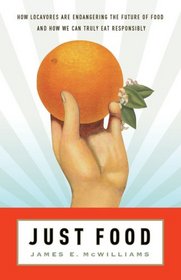Helpful Score: 2
I had such high hopes for this book. I was initially drawn to it because something about the locavore movement seemed not quite right...... many fall root vegetables are difficult to prepare in an appetizing way, and as an East Coast resident I don't wish to eat canned potatoes and pickled onions all winter. Unfortunately, James McWilliams' book extends beyond addressing the locavores, to declare that consumers who try to be ecologically conscientious by purchasing organic produce and grass-fed beef are also wrong. He presents well-researched arguments for considering GM crop technology and the benefits of aquaculture. Clearly he wants to induce a change of heart in the reader about these technologies, but unless the reader is the CEO of Monsanto who then decides to give such technologies to third world countries for free, the end result of the discussion will be nothing.
Admittedly, there are problems associated with a Michael Pollan type diet: beef is still resource intensive and costly to produce, organic farming methods still use harmful but naturally occurring pesticides, but McWilliams often conveniently disregards the fact that as individual consumers, these buying decisions are the only means we have to make a difference (albeit a very small one.) In a section that apparently slipped by the proofreader, McWilliams states that "Ultimately, however, these solutions are left for others to design and implement. We can only stand by and encourage these plans (which is admittedly, all we can do when it comes to many of the thorniest agricultural issues.)"
The audience for a book such as this is the same Michael Pollan crowd that McWilliams feels is not doing enough, even though they now have chickens in their backyards and have joined the local CSA farm. So what's his problem with his audience? "As I hope is clear by now, scaling down food production and eating local fare is not in and of itself going to feed the impending 10 billion in a sustainable way." This is oversimplifying the problems that a growing global population presents. Even if all of western society converted to a diet of vegetables and farm-raised trout so that we could grow extra food for poor countries, how is the food going to get there? Once everyone is full, how are they going to support themselves? How will they get potable water? How will they dispose of their waste in a sanitary way? A true environmentalist should thinking bigger than McWilliams asks us to think.
As a consumer who tries to be thoughtful, this book left me frustrated. Other than not eating meat and "supporting" aquaculture and GM crops and opposing farm subsidies (things that the by the author's own admission are little more than thought experiments for the average consumer), Just Food comes across as chastising of those who try to do right with no concrete ideas for how to do better.
Admittedly, there are problems associated with a Michael Pollan type diet: beef is still resource intensive and costly to produce, organic farming methods still use harmful but naturally occurring pesticides, but McWilliams often conveniently disregards the fact that as individual consumers, these buying decisions are the only means we have to make a difference (albeit a very small one.) In a section that apparently slipped by the proofreader, McWilliams states that "Ultimately, however, these solutions are left for others to design and implement. We can only stand by and encourage these plans (which is admittedly, all we can do when it comes to many of the thorniest agricultural issues.)"
The audience for a book such as this is the same Michael Pollan crowd that McWilliams feels is not doing enough, even though they now have chickens in their backyards and have joined the local CSA farm. So what's his problem with his audience? "As I hope is clear by now, scaling down food production and eating local fare is not in and of itself going to feed the impending 10 billion in a sustainable way." This is oversimplifying the problems that a growing global population presents. Even if all of western society converted to a diet of vegetables and farm-raised trout so that we could grow extra food for poor countries, how is the food going to get there? Once everyone is full, how are they going to support themselves? How will they get potable water? How will they dispose of their waste in a sanitary way? A true environmentalist should thinking bigger than McWilliams asks us to think.
As a consumer who tries to be thoughtful, this book left me frustrated. Other than not eating meat and "supporting" aquaculture and GM crops and opposing farm subsidies (things that the by the author's own admission are little more than thought experiments for the average consumer), Just Food comes across as chastising of those who try to do right with no concrete ideas for how to do better.




